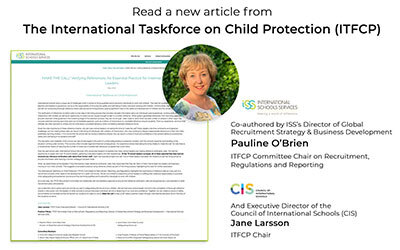International schools face a unique set of challenges when it comes to hiring qualified and trustworthy individuals to work with children. The need for qualified and experienced teachers and leaders is paramount, but so is the responsibility of ensuring the safety and well-being of every individual working with children. Unfortunately, many school leaders are still not conducting thorough reference check calls during the hiring process, posing significant risks to the safety and development of children and the school community.
The verification of references via direct calls is a key step in the hiring process that provides valuable information about an individual’s past experiences, working style, and interactions with children as well as an opportunity to check out any issues brought to light in a written reference. While system-generated references from recruiting agencies can provide important initial guidance in the screening stage of the selection process, they are not enough. Calls made to verify what has been written or shared in other ways may uncover potential warning signs that were not immediately apparent, such as a history of misconduct or unsuitable behaviour around students. From our experience, we know that referees are often reluctant or simply will not write about unsuitable behaviour when completing standard reference forms.
Given the vital importance of these reference checks, why are many school leaders not taking the time to ‘make the call’? Many leaders cite time constraints and logistical challenges, but not making these calls can result in the hiring of individuals with a history of misconduct, who may continue to display inappropriate behaviours in their new roles, potentially harming children. If it is found that the school did not conduct reference checks, this can result in a loss of trust and confidence in the school’s ability to prioritize the safety and well-being of its students and staff.
The reputation and credibility of the school can also be damaged in the event of a child safeguarding or protection incident, with the school’s response and handling of the situation coming under scrutiny. This scrutiny often includes legal and financial consequences. Our experience shows that taking the time initially to ‘make the call’ for new hires is a fundamental means of reducing the number of instances of problematic behaviour by adults that could follow.
Over the past school year, International School Services (ISS) conducted research to explore how many school leaders are making reference verification calls. ISS had the opportunity to speak with over 70 school leaders, gathering invaluable insights into their experiences. Of the 70 school leaders surveyed, 60 of them reported that they had not received any reference verification calls about their former staff. Eight had received at least one call. Two of these leaders had taken the initiative to call the hiring school to provide information after learning a former colleague had been hired.
When we asked these school leaders if they themselves made reference verification calls, they responded that they did. Each of them had at least two leaders and teachers moving on from their schools. This suggests inconsistent practice using reference checks as part of the hiring process, highlighting the need for further exploration.
The International Taskforce on Child Protection (ITFCP) Committee for Recruitment, Reporting, and Regulations highlights the importance of reference calls as a key part of a recruitment process which leads to the development of a safer community. We are committed to supporting school leaders in fulfilling their collective responsibility to prioritize child safeguarding and protection and ensure they are hiring qualified and trustworthy individuals to work with children.
As a next step, the ITFCP Recruitment Committee will collaborate with Accreditation agencies to ensure that reference verification calls are recognized as a core standard of safer recruitment policy and practice.
Let us take this call to action seriously and do our part in safeguarding the future of our children. We ask that every school leader commit to the completion of thorough reference checks in discussion with the leaders of other schools to ensure that every individual we hire is deserving of our trust and confidence. Together, we can create a culture of safety, accountability and excellence that will benefit our students for years to come. Make the call to help us all make a positive impact through international education and in the lives of the students we serve.
Authored By:
Jane Larsson, ITFCP Chair; Executive Director – Council of International Schools (CIS)
Pauline O’Brien, ITFCP Committee Chair on Recruitment, Regulations and Reporting; Director of Global Recruitment Strategy and Business Development – International Schools Services (ISS)
- Pauline O’Brien, Committee Chair
Director of Global Recruitment Strategy & Business Development at ISS
- Jane Foster, Committee Co-chair
Safeguarding Works Ltd
Committee Members
- Chris Akin, Head of School at Laude Lady Elizabeth School
- Steven May, Deputy Regional Security Officer with U.S. Department of State
- Rachel Edwards, Head of Secretary at Dover Court International School
- Greg MacGilpin, Head of School at Baldwin School of Puerto Rico
- Mark Hevland, Director of Risk Management at International School Bangkok
- Andy Phippen, Professor of Social Responsibility in IT at University of Plymouth
- Rebecca Hinchliffe, Designated Safeguarding Lead at AQA Exam Board, UK
- Ash Pugh, Founder / CEO of Skoolspot
- Lia Gould, Clinical Psychologist, Senior Safeguarding Lead at UWCSEA
- Mark Stapleton, Director of External Affairs at New England Association of Schools and Colleges
ISS is dedicated to ensuring child protection in schools. Read More »

